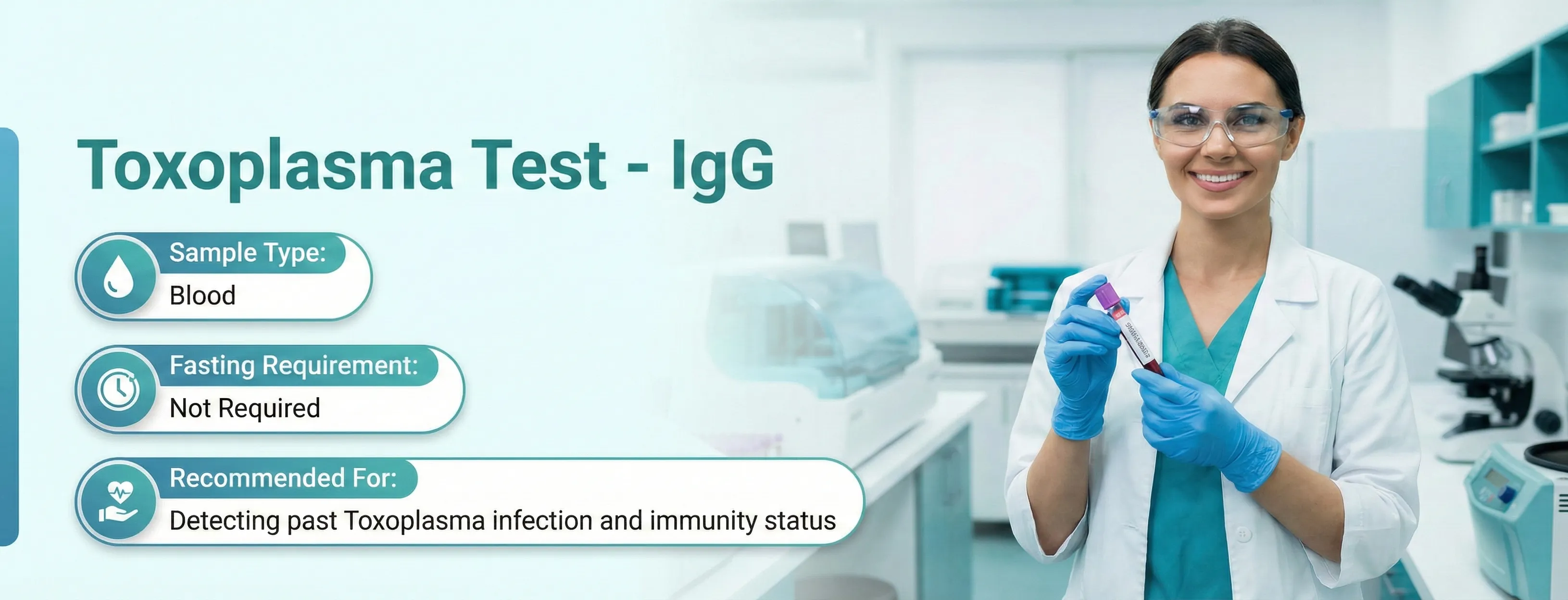6+ orders placed in your location
100% NABL & ISO Certified Lab • 100% Accurate Reports
Toxoplasma Test - IgG
Toxoplasma gondii test, Toxoplasmosis test, Toxoplasma gondii IgG test
- SummaryThe Toxoplasma IgG Test detects IgG antibodies against Toxoplasma gondii, indicating a past or long-term infection. It is often used to assess immunity, especially in pregnant women or individuals with weakened immunity. A blood sample is required, no fasting is needed, and the test is suitable for all age groups and genders as recommended by a healthcare provider.Read more
- Reports Within13 HrsView Sample Report100% NABL & ISO Certified Labs
- SampleBlood
- AgeAll Age Group
- GenderMale and Female
- FastingNot Required
PharmEasy Promises
Know More About The Test
A quick info on Toxoplasma Test - IgG
Overview
Toxoplasmosis is a disease that is caused by a parasite called Toxoplasma Gondii. The parasite can only be seen by a microscope. Mostly in healthy adults, the infection proves to be harmless.
However, if a pregnant woman is diagnosed with the infection, then it may be transmitted to her unborn child. The infection may result in miscarriages, and stillbirths or can lead to severe problems in the newborn such as mental retardation, blindness and an enlarged liver or spleen. Some babies may look normal at birth but may develop complications with age, such as chronic eye and ear infections, learning disabilities, etc.
The infection is highly dangerous for a person with a weakened immune system and may damage the nervous system, causing headaches, seizures, confusion, fever, encephalitis, loss of coordination, blurred vision, etc. To detect the disease, the Toxoplasma IgG test is ordered by the doctors. It's a blood test that checks the presence of antibodies to the Toxoplasma Gondii parasite in your body.
Some causes of the infection are mentioned below:
- Eating unwashed or adulterated food or eating raw meat
- Coming in contact with contaminated soil
- Drinking contaminated water or unpasteurized milk
- Cleaning cat litter
In India, people, especially women residing in mud houses, are more exposed to the risk of contracting the disease. The disease is common in South India as most of the people in this region were found with toxoplasmosis antibodies in their bodies. Women living in the western part are at the lowest risk. Overall, an estimated 56,737–176,882 children per year are born with a high risk of congenital Toxoplasmosis in India.
Other Names Of Toxoplasma IgG
- Toxoplasma Gondii test
- Toxoplasmosis test
- Toxoplasma test
- Toxoplasma Gondii IgG test
- Toxoplasma Gondii antibody testing
What Does The Toxoplasma Test Detect/Measure? Who Is This Prescribed For?
The test specifically looks for the serum antibodies to the toxoplasma parasite in the person's body and determines whether you have the infection or not.
Healthcare experts generally prescribe the toxoplasma IgG test to persons having the below-mentioned symptoms:
- Flu-like illness
- Swollen lymph nodes
- Fever and night sweats
- Weakness and fatigue
- Headache and body aches
- Sore throat
- Eye inflammation and fever
- Diarrhoea and vomiting
- Weight loss
- Neurological symptoms
- Jaundice (yellowing of eyes and body)
- Swollen lymph nodes
- Difficulty in breathing due to pneumonia
- Anorexia
Doctors also prescribe this test to a person having the following diseases or conditions:
- During pregnancy
- A person with a weak immune system
- HIV-positive persons
The test is not routinely ordered for pregnant women but may be ordered if the doctor wants to determine if a woman has previously had Toxoplasmosis and if she has come in contact with cat litter, eaten raw or undercooked meat or had contaminated food/water.
Sample Type
The patient's blood sample is required for the toxoplasma test. The sample is collected usually from the patient's vein of your arm. You can get the toxoplasma test results within 24 to 36 hours. In some cases, cerebrospinal fluid is taken as a sample. In the case of pregnant women, an amniotic fluid sample is taken for testing.
Test Preparation
No fasting or special preparations are required for the test. However, a person must tell a doctor if you have been in contact with a cat, cleaned a litter box, has problems with clotting or bleeding, etc.
There are certain minute risks attached to the toxoplasma test procedure, such as minor pricking pain felt at the point of needle prick.
Test results may get compromised if you are already on some medication or had/having over-the-counter drugs. You must tell your doctor about medications beforehand to get accurate results.
Test Inclusions: What Parameters Are Included?
The following parameters are included in the Toxoplasma Gondii test:
- Ascertain whether the blood sample has antibodies to the toxoplasma Gondii parasite.
- Detects the toxoplasma infection in a pregnant woman, her unborn baby or in a person having a weak immune system.
In the toxoplasma IgG test report, your antibody levels are expressed in international units per millilitre (IU/mL). The test determines whether you have toxoplasmosis disease. The number and type of antibodies in your body indicate whether the infection was new or old. Your healthcare expert may order more than one test for further analysis.
Usually, in adults, Toxoplasmosis causes no harmful problems and does not require treatment. However, if a pregnant woman contracts the infection, it may pass to her unborn child. The infection may damage the brain of the child and may cause blindness.
A person who has a weakened immune system is more exposed and at more risk to the Toxoplasma Gondii infection. After contracting the infection, your body will have toxoplasma Gondii antibodies for the rest of your life. That usually means that you will not contract the infection again. The toxoplasma test results are generally produced within 3 days.
How Frequently Should You Take This Test?
If a person is diagnosed with Toxoplasmosis, a disease caused by the Toxoplasma Gondii parasite, in the first test, then further tests are ordered by the healthcare provider to confirm the results. The tests can also be repeated while the person is on medication for Toxoplasmosis to check the effectiveness of the medication. In pregnant women, the test can be repeated 10 days after the birth of the child.
Risk Assessment
Abnormalities in the foetus, Toxoplasmosis infection in a newborn child
Ranges
The toxoplasma test reports take 1 to 3 days to be ready and are usually given in titers. A titer is a measurement of blood sample concentration diluted with saline before the antibodies can no longer be found.
Toxoplasma IgG Test ranges laboratory-wise. Your lab report should show the range that your lab uses for each test. These ranges serve their purpose as a guide. Your healthcare expert analyses your toxoplasma report on the basis of your age, health and other related factors. Toxoplasma's normal range may not be normal for you, but another range might be normal for you, depending on the analysis of your doctor.
The toxoplasma results are generally expressed in infection positive/negative. Below-mentioned are the reference values of the test:
Reference Ranges | Interpretation |
Value of ≥5 IU/ml | Positive |
Range from 3 to 5 IU/ml | Equivocal |
Value of <3 IU/ml. | Negative |
These ranges are not universal and may vary.
Test Result Interpretation
Positive test results generally indicate that you are infected with the toxoplasmosis disease at present or have contracted the disease before. If you have ever come in contact with the Toxoplasma Gondii, antibodies will be present in your blood or usually form within 2 weeks after you are infected with the disease. You will test positive for the antibodies after they are formed in the blood.
However, being positive doesn't necessarily mean that you have Toxoplasmosis at present.
If you've tested positive earlier, then your doctor might order further tests to determine the exact time when you had the infection.
If a pregnant woman is tested positive, then her foetus has a higher chance of getting the infection. In such a case, the doctors generally test your amniotic fluid and the foetus' blood. He may also order an ultrasound to determine whether the foetus has been infected.
If your foetus is diagnosed with toxoplasmosis disease, then you may require genetic counselling.
You may terminate the pregnancy, depending on the gestation period. However, if you wish to continue the pregnancy, your doctor will prescribe certain antibiotics and other medications to reduce the further risk for the baby. A newborn having toxoplasma IgM antibodies in the body indicates a congenital infection.
A negative test result means that there are extremely fewer chances that the person has Toxoplasmosis but doesn't rule out the risk of infection. Equivocal results indicate inconclusiveness of the results, so the doctor may order a second test 3 weeks after the first test to get accurate results.
Negative IgM and IgG results indicate that the person isn't immunized against Toxoplasmosis and if a pregnant woman contracts the infection, it can get passed to the foetus. Positive IgG results indicate that the person has immunity against the parasite, so the foetus isn't at risk.
Was This Test Information Helpful?
Please rate your experience
References
People Also Ask
What is the normal range of Toxoplasma IgG?
What is a Toxoplasma test?
What does it mean if IgG is positive?
How long does Toxoplasma IgG stay positive?
What does Toxoplasma IgG positive mean?
Have any doubts? Ask us.
Ask us anything about the Toxoplasma Test - IgG to understand it better
We provide trusted, expert-curated health content to support better awareness,prevention, and care.
Backed by experienced doctors, medical experts, and strict editorial standards.


